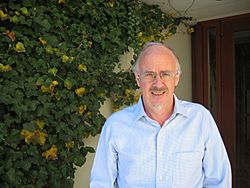David Masser facts for kids
Quick facts for kids
David Masser
|
|
|---|---|
 |
|
| Born | 8 November 1948 London, United Kingdom
|
| Alma mater | University of Cambridge |
| Known for | Masser–Gramain constant Oesterlé–Masser conjecture Sparsely totient number |
| Awards | ICM Speaker (1983) Humboldt Prize (1991) Fellow of the Royal Society (2005) Member of the Academia Europaea (2014) |
| Scientific career | |
| Fields | Mathematics |
| Institutions | University of Basel |
| Doctoral advisor | Alan Baker |
| Doctoral students | Philipp Habegger Paula Tretkoff |
David William Masser, born on November 8, 1948, is a very smart mathematician from the United Kingdom. He used to be a professor at the University of Basel in Switzerland. He is well-known for his important work in special areas of mathematics.
Professor Masser studies numbers and equations in deep ways. He helped create something called the "abc conjecture" in 1985 with another mathematician, Joseph Oesterlé. This conjecture is a big puzzle in mathematics that many experts are still trying to solve!
Contents
Early Life and School
David Masser was born in London, England. He went to Trinity College at the University of Cambridge. He earned his first degree there in 1970.
Later, in 1974, he received his Master's degree and his Ph.D. from the same university. For his Ph.D., he wrote a special paper about "Elliptic Functions and Transcendence." His teacher for this important work was a famous mathematician named Alan Baker.
Professor Masser's Career
David Masser started his teaching career at the University of Nottingham. He was a lecturer there from 1973 to 1975. After that, he spent a year doing research at Trinity College, Cambridge.
He returned to the University of Nottingham and taught there until 1983. Then, he moved to the United States and became a professor at the University of Michigan. He worked there from 1983 to 1992. In 1992, he moved to Switzerland to teach at the University of Basel. He became a professor emeritus there in 2014, which means he retired but still holds an honorary title.
What Professor Masser Studies
Professor Masser's main research areas are about understanding different kinds of numbers and how they relate to each other. He studies "transcendental number theory," which looks at numbers that cannot be the solution to simple equations.
He also works on "Diophantine approximation" and "Diophantine geometry." These fields deal with finding whole number solutions to equations and studying shapes using numbers. The "abc conjecture" that he helped create is a big part of his research. It helps mathematicians understand how numbers behave in certain equations.
Awards and Honors
Professor Masser has received many awards for his important work in mathematics. In 1983, he was invited to speak at a big meeting of mathematicians in Warsaw.
In 1991, he won the Humboldt Prize, which is a special award for scientists. He was also chosen to be a Fellow of the Royal Society in 2005. This is a very high honor for scientists in the United Kingdom. In 2014, he became a member of the Academia Europaea, which is a group of top European scholars.
See Also
- Analytic subgroup theorem
- Bézout's theorem
- Zilber–Pink conjecture
 | Audre Lorde |
 | John Berry Meachum |
 | Ferdinand Lee Barnett |

